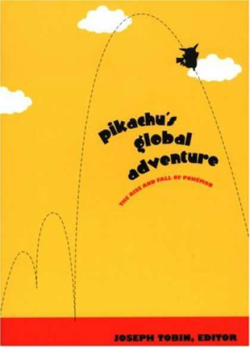Pikachu's Global Adventure: Difference between revisions
mNo edit summary |
No edit summary |
||
| Line 5: | Line 5: | ||
|image_size=250px | |image_size=250px | ||
|ISBN=978-0822332879 | |ISBN=978-0822332879 | ||
|pages=306 | |||
|publisher=Duke University Press | |publisher=Duke University Press | ||
|author=Joseph Tobin | |author=Joseph Tobin | ||
Revision as of 00:29, 13 January 2020

|
This article is incomplete. Please feel free to edit this article to add missing information and complete it. |
| Pikachu's Global Adventure | |
|---|---|

| |
| ISBN: | 978-0822332879 |
| Pages: | 306 |
| Published: | February 2004 |
| Publisher: | Duke University Press |
| Author: | Joseph Tobin |
Pikachu's Global Adventure: The Rise and Fall of Pokémon is a book that was released by the Duke University press in 2004. The book is a documentary that focuses on how Pokémon became a worldwide hit among children and teens from its beginning in Japan in 1996, all the way through what was claimed to be its decline during the start of Generation III in 2003. It also contains several "secrets" about the franchise.
Choice of Pikachu as the mascot
Pikachu was chosen over Clefairy, the mascot of the comic series, in order to appeal to young girls and their mothers by appearing to be more of a pet. Additionally, Pikachu's yellow color was more recognizable at a distance and the only other yellow character at the time was Winnie the Pooh.
Fall of Pokémon
The fall of Pokémon was defined as the declining sales starting about 2001 or so. Spell of the Unown: Entei received a more limited theatrical release and lower box office performance than the first two movies. Additionally, there was far less shelf space in toy stores. An essay by Samuel Tobin reported that the games were more rarely seen in playgrounds and schools. However, Pokémon was still a top-selling product. Although the 2001 release of Pokémon Stadium 2 sold worse than the 1999 release of Pokémon Yellow, it was still one of the top three games that year. For some reason, the book doesn't mention Pokémon Ruby and Sapphire, which were released shortly before the book was published, although they also sold more poorly than the previous generations.

|
This book article is part of Project Merchandise, a Bulbapedia project that aims to write comprehensive articles on all Pokémon toys, dolls, books, and collectible merchandise. |